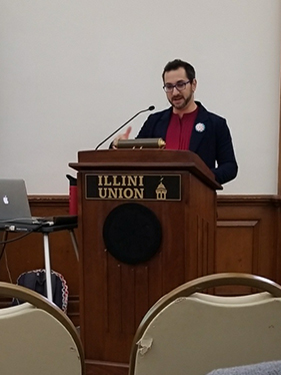On Tuesday, December 5th, 2017, Dr. Z Nicolazzo delivered the last campus lecture of the fall semester for the Dean’s Diversity Lecture Series, entitled "Wedge Politics: The Current Transgender Backlash and Its Effects in Educational Settings." Dr. Nicolazzo is an assistant professor in the Adult and Higher Education program and a faculty associate in the Center for the Study of Women, Gender, and Sexuality at Northern Illinois University. Dr. Nicolazzo is the author of Trans* In College: Transgender Students' Strategies for Navigating Campus Life and the Institutional Politics of Inclusion.
Dr. Nicolazzo began the lecture by acknowledging the fact that we are on stolen lands, specifically the lands belonging to the Haudenosaunee and Miami tribes. Dr. Nicolazzo also shared that the educational community continues to benefit from an ongoing complicity with settler colonization, and this relates to Dr. Nicolazzo’s work because “we must never forget that the current gender binary discourse ensnares all of our college environments and is violently enforced as a result of settler colonization” (Nicolazzo, 2017b). Considering this link, how are we as educators working to create environments that will improve the lives of our marginalized populations? In other words, how does the language of diversity translate into transformative spaces for the multiply marginalized? Not only is there resistance at the top levels of the organizations, but also many throughout the institutions, including students, staff, and faculty, resist policy change designed to create transformative learning spaces. Diversity, according to Ahmed (2012), “is a sign of the lack of commitment to change and might even allow organizations such as universities to conceal the operation of systemic inequalities” (p. 53).
Dr. Nicolazzo, being a former history major, reminds us we must look backward in order to move forward, recognizing the role history plays in shaping the current socio-political landscape. To do this, Dr. Nicolazzo reveals essential aspects of the liberal playbook. For example, Dr. Nicolazzo reexamines Obama’s presidency, during which some political pundits along with news correspondents labeled him as the most progressive president, especially concerning lesbian, gay, bisexual, and transgender folks. Dr. Nicolazzo goes on to expose the limits of a liberal base, asserting that Obama did not advance progress for transgender folks, in particular noting Obama’s “symbolic acceptance” by revealing that one of the limits of a liberal base includes the transgender population. Dr. Nicolazzo exposes how the liberal base uses transgender folks as a wedge issue, which Dr. Nicolazzo defines as an issue “that is understood to be divisive or controversial, and that splits apart a political group” (Nicolazzo, 2017b). So how does this understanding impact the ways in which we serve transgender college students?
Dr. Nicolazzo begins by calling attention to the attacks upon “public” education, noting the drastic reduction in funding and its impact upon progressive educational policies, which are often not forwarded along due to the threat of reduced funding and public shaming. Administrators are far more conservative with regard to our marginalized students and worry about their donor base rather than the humanity of our transgender students, staff, and faculty. Administrative worries further reduce access to resources, and not just gender-inclusive restrooms, but also a lack of queer- and transgender-inclusive curricula and educators who affirm their transgender students.
Colleges and universities are growing more aware of the challenges facing lesbian, gay, bisexual, transgender, and gender non-conforming members in their communities, but we find ourselves in very troubling times. As I write this blog, yet another Black transgender woman has been murdered (RIP Brandi). The isolation, invisibility, and silence continue to mark the most marginalized for death. We must, as Dr. Nicolazzo reminds us, “think about the world we need and deserve, and not be satisfied with what we have been given” (Nicolazzo, 2017b). As we mark the 40th anniversary of the Combahee River Collective Statement, Demita Frazier, one of the original co-writers, remarks,
the point of talking about Combahee is not to be nostalgic; rather, we talk about it because Black women are still not free . . . if Black women were free, it would mean that everyone else would have to be free since our freedom would necessitate the destruction of all the systems of oppression. (Taylor, 2017, pp. 14, 22-23)
So, when we imagine spaces, spaces in which Black and Brown women, Black and Brown transgender women, and Black and Brown gender non-binary/gender non-conforming folks find spaces where healing and transformation take place, the path toward liberation becomes clearer. I join Dr. Nicolazzo in asking, “What are we willing to give up in the name of justice” (Nicolazzo, 2017b)?
References
- Ahmed, S. (2012). On being included: Racism and diversity in institutional life. Durham, NC: Duke University Press.
- Nicolazzo, Z. (2017a). Trans* in college: Transgender students’ strategies for navigating campus life and the institutional politics of inclusion. Sterling, VA: Stylus Publishing.
- Nicolazzo, Z. (2017b). Wedge Politics: The Current Transgender Backlash and Its Effects in Educational Settings. Presentation at the University of Illinois Dean’s Diversity Lecture Series, Urbana, IL.
- Taylor, K-Y. (2017). How we get free: Black feminism and the Combahee River Collective. Chicago, IL: Haymarket Books.
